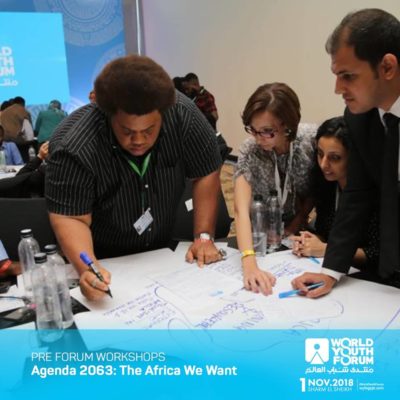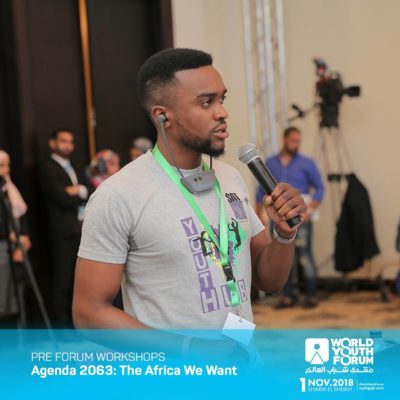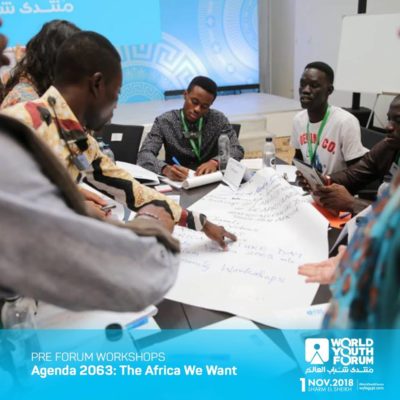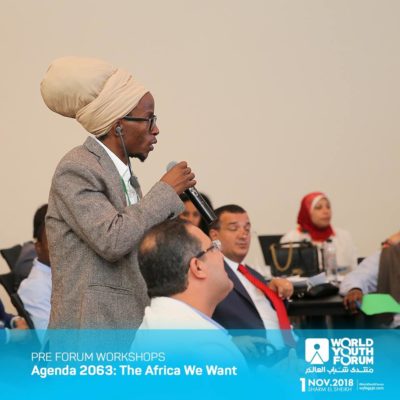CAIRO – 1 November 2018: The World Youth Forum (WYF) kicked off today with its pre-forum workshops; the fist of which was titled, 'Agenda 2063: The Africa We Want’. The forum is being held in Sharm el-Sheikh between November 3 and 6, 2018.
The workshop covered a wide array of topics from Information and Communications Technology, to combating terrorism at state and non-state levels, to small- and medium-sized enterprise, to marketing the African continent.
Each topic was looked at head on by a group of individuals from 20 different African countries, all of whom have enough courage and energy to change the African image in front of the whole world and bring resources together to ensure Africa develops sustainably.
[caption id="attachment_928" align="aligncenter" width="400"]

During the WYF pre-forum workshop, November 1, 2018 - Courtesy of WYF official Facebook page[/caption]
Dissecting the different issues
One of the topics that were looked at during the workshop was digitalizing Africa. The second team took this topic on.
The team spoke of the importance of developing technology and lobbing for higher standards of education to ensure that individuals are able to innovate and create.
“We are putting a framework for an initiative to promote technology and create ‘Digital Africa’ or ‘AfriTech’; this could be a trend for African companies, SMEs and such, to use so we can attract big names and encourage technology transfers and the sharing of information,” said the second team.
The team spoke of the importance of ensuring that we do not simply innovate but that we also share expertise and learn from one another in order to become the best version of ourselves.
[caption id="attachment_929" align="aligncenter" width="400"]

During the WYF pre-forum workshop, November 1, 2018 - Courtesy of WYF official Facebook page[/caption]
The third team, who looked at the role of individuals in combating terrorism, spoke of the issues that cause terrorism to expand and how individuals and governments can combat it.
Sharing their countries’ experiences in combating terrorism, Ahmed Sabry, an Egyptian on the team, said, “Some youths in Africa are facing financial challenges because they cannot find work and so they are sometimes attracted to terrorism in exchange of money.”
In which case, the sole reason that the people who commit terrorist acts do so is because they are in need of money.
“Unemployment, like poverty, is a way to take advantage of the youth, making them commit terrorist acts for money,” suggested Sabry, adding, “Africa, in general, is not very good at utilizing its natural resources. Terrorists often take advantage of a lot of our natural resources. We need to take control of the resources and use them well.”
Abdelhamed from Nigeria, part of the third group, said, “Part of the solution was policy-approach: Young people need to be part of the policy-cycle.”
Abdelhamed argued that it is vital for individuals to take on the responsibility of becoming part of the policy-cycle by lobbying those in charge and in office and telling them what they think should be done.
“Also, creating intelligent information to state actors. This is sharing information with state actors because we know ourselves and we know our neighbours and if we know that there is something wrong and they are starting to go the other way, we need to take action,” Abdelhamed stated.
The third team recommended creating an anti-terrorism campaign online and an advocacy group, relying on the tech-savvy nature of young people and their high energy levels.
Resources should also be evenly distributed because those who are marginalized are more attracted to terrorism, the third team recommended.
[caption id="attachment_930" align="aligncenter" width="400"]

During the WYF pre-forum workshop, November 1, 2018 - Courtesy of WYF official Facebook page[/caption]
As for the fourth team, they spoke about small- and medium-sized enterprises and how they can get funded; they also developed the topic a bit and took on the issue of community projects and how they should also be funded.
After studying the problem and discussing the issues related to relying on international loans and grants, the fourth team offered crowd funding as the number one solution to the issue. “Crowd funding is when you encourage a lot of people to contribute to a community issue. You reach out to individuals to get them to give a little bit to your project,” the first speaker from the group said.
However, the team did not stop there. In fact, they went on to offer another ten stellar ideas on how to ensure that funding is no longer reliant on the whims of entities or regulations that may be hard to satisfy.
The fourth team suggested: social enterprise, membership registration, social development funds, charity and fundraising, development banks (for agricultural and industrial projects), soft grants, corporate social responsibility, competitions and awards, community development organizations, and Savings and Credit Cooperative (SACCOS). These ten solutions, plus crowd funding, can help Africa rid itself of its need for international aid.
[caption id="attachment_931" align="aligncenter" width="400"]

During the WYF pre-forum workshop, November 1, 2018 - Courtesy of WYF official Facebook page[/caption]
The fifth, and final, group spoke of branding the continent; a topic that the panellist described to be “not an easy task at all.”
“It is all about the global image for Africa and we made up a theme: ‘Proudly Made in Africa’,” said the fifth group’s primary speaker, echoing a theme that was pushed earlier this year by COMESA Business Council’s Amany Asfour, ‘Made in Africa’.
“When people think of Africa what usually comes to mind is disease, famine, war, terror, so we are looking at how we can right this narrative.” The group believes that there is a need to combat that narrative to change it, one of the measures they suggested is making individuals more aware of the effect their use of social media has on the image of Africa. One of the team members explained that if one is to post an image of something that may be upsetting them on the street in Africa or whatever, this could lead someone—who has never been to Africa countries—think that this is what Africa is like. This becomes increasingly more likely, the team member explained, with those who are less educated.
“We want to change Africa from one that relies on external grants to being self-sustainable. … We are looking at an Africa that is resourceful.”
Furthermore, innovation is key, the team explained. “Internally, there is a need to innovate in individuals’’ knowledge to be used all over Africa.”
“We have so much that we can give but as long as it is at the crude level, we cannot do much with it. But when we innovate it and make it marketable, it is profitable.”
For the fifth team, marketing a new image of Africa is key for a new, self-sustainable Africa. “Branding for Africa is one of the toughest topics because we need some hefty efforts to re-brand the continent,” Maged Talaat, Secretary of the Egyptian Political Education Committee
“Africa is home to many resources. It is home to the world’s food needs during the next period, and it is rich in its resources.”
“Africa is rich in renewable energy. In Europe, they are substituting fuel for solar energy and I think this is something we can make use of and we can export to them,” Talaat said.
Wrapping up the pre-forum session, the panellist thanked all the participants for their ideas and their fruitful suggestions.
As a result of the excellent ideas presented in the session, the panel decided to develop initiatives in order to give the youth a chance to lead continental change.
 Thu, Nov. 1, 2018
Thu, Nov. 1, 2018
 During the WYF pre-forum workshop, November 1, 2018 - Courtesy of WYF official Facebook page[/caption]
During the WYF pre-forum workshop, November 1, 2018 - Courtesy of WYF official Facebook page[/caption]
 During the WYF pre-forum workshop, November 1, 2018 - Courtesy of WYF official Facebook page[/caption]
The third team, who looked at the role of individuals in combating terrorism, spoke of the issues that cause terrorism to expand and how individuals and governments can combat it.
Sharing their countries’ experiences in combating terrorism, Ahmed Sabry, an Egyptian on the team, said, “Some youths in Africa are facing financial challenges because they cannot find work and so they are sometimes attracted to terrorism in exchange of money.”
In which case, the sole reason that the people who commit terrorist acts do so is because they are in need of money.
“Unemployment, like poverty, is a way to take advantage of the youth, making them commit terrorist acts for money,” suggested Sabry, adding, “Africa, in general, is not very good at utilizing its natural resources. Terrorists often take advantage of a lot of our natural resources. We need to take control of the resources and use them well.”
Abdelhamed from Nigeria, part of the third group, said, “Part of the solution was policy-approach: Young people need to be part of the policy-cycle.”
Abdelhamed argued that it is vital for individuals to take on the responsibility of becoming part of the policy-cycle by lobbying those in charge and in office and telling them what they think should be done.
“Also, creating intelligent information to state actors. This is sharing information with state actors because we know ourselves and we know our neighbours and if we know that there is something wrong and they are starting to go the other way, we need to take action,” Abdelhamed stated.
The third team recommended creating an anti-terrorism campaign online and an advocacy group, relying on the tech-savvy nature of young people and their high energy levels.
Resources should also be evenly distributed because those who are marginalized are more attracted to terrorism, the third team recommended.
[caption id="attachment_930" align="aligncenter" width="400"]
During the WYF pre-forum workshop, November 1, 2018 - Courtesy of WYF official Facebook page[/caption]
The third team, who looked at the role of individuals in combating terrorism, spoke of the issues that cause terrorism to expand and how individuals and governments can combat it.
Sharing their countries’ experiences in combating terrorism, Ahmed Sabry, an Egyptian on the team, said, “Some youths in Africa are facing financial challenges because they cannot find work and so they are sometimes attracted to terrorism in exchange of money.”
In which case, the sole reason that the people who commit terrorist acts do so is because they are in need of money.
“Unemployment, like poverty, is a way to take advantage of the youth, making them commit terrorist acts for money,” suggested Sabry, adding, “Africa, in general, is not very good at utilizing its natural resources. Terrorists often take advantage of a lot of our natural resources. We need to take control of the resources and use them well.”
Abdelhamed from Nigeria, part of the third group, said, “Part of the solution was policy-approach: Young people need to be part of the policy-cycle.”
Abdelhamed argued that it is vital for individuals to take on the responsibility of becoming part of the policy-cycle by lobbying those in charge and in office and telling them what they think should be done.
“Also, creating intelligent information to state actors. This is sharing information with state actors because we know ourselves and we know our neighbours and if we know that there is something wrong and they are starting to go the other way, we need to take action,” Abdelhamed stated.
The third team recommended creating an anti-terrorism campaign online and an advocacy group, relying on the tech-savvy nature of young people and their high energy levels.
Resources should also be evenly distributed because those who are marginalized are more attracted to terrorism, the third team recommended.
[caption id="attachment_930" align="aligncenter" width="400"] During the WYF pre-forum workshop, November 1, 2018 - Courtesy of WYF official Facebook page[/caption]
As for the fourth team, they spoke about small- and medium-sized enterprises and how they can get funded; they also developed the topic a bit and took on the issue of community projects and how they should also be funded.
After studying the problem and discussing the issues related to relying on international loans and grants, the fourth team offered crowd funding as the number one solution to the issue. “Crowd funding is when you encourage a lot of people to contribute to a community issue. You reach out to individuals to get them to give a little bit to your project,” the first speaker from the group said.
However, the team did not stop there. In fact, they went on to offer another ten stellar ideas on how to ensure that funding is no longer reliant on the whims of entities or regulations that may be hard to satisfy.
The fourth team suggested: social enterprise, membership registration, social development funds, charity and fundraising, development banks (for agricultural and industrial projects), soft grants, corporate social responsibility, competitions and awards, community development organizations, and Savings and Credit Cooperative (SACCOS). These ten solutions, plus crowd funding, can help Africa rid itself of its need for international aid.
[caption id="attachment_931" align="aligncenter" width="400"]
During the WYF pre-forum workshop, November 1, 2018 - Courtesy of WYF official Facebook page[/caption]
As for the fourth team, they spoke about small- and medium-sized enterprises and how they can get funded; they also developed the topic a bit and took on the issue of community projects and how they should also be funded.
After studying the problem and discussing the issues related to relying on international loans and grants, the fourth team offered crowd funding as the number one solution to the issue. “Crowd funding is when you encourage a lot of people to contribute to a community issue. You reach out to individuals to get them to give a little bit to your project,” the first speaker from the group said.
However, the team did not stop there. In fact, they went on to offer another ten stellar ideas on how to ensure that funding is no longer reliant on the whims of entities or regulations that may be hard to satisfy.
The fourth team suggested: social enterprise, membership registration, social development funds, charity and fundraising, development banks (for agricultural and industrial projects), soft grants, corporate social responsibility, competitions and awards, community development organizations, and Savings and Credit Cooperative (SACCOS). These ten solutions, plus crowd funding, can help Africa rid itself of its need for international aid.
[caption id="attachment_931" align="aligncenter" width="400"] During the WYF pre-forum workshop, November 1, 2018 - Courtesy of WYF official Facebook page[/caption]
The fifth, and final, group spoke of branding the continent; a topic that the panellist described to be “not an easy task at all.”
“It is all about the global image for Africa and we made up a theme: ‘Proudly Made in Africa’,” said the fifth group’s primary speaker, echoing a theme that was pushed earlier this year by COMESA Business Council’s Amany Asfour, ‘Made in Africa’.
“When people think of Africa what usually comes to mind is disease, famine, war, terror, so we are looking at how we can right this narrative.” The group believes that there is a need to combat that narrative to change it, one of the measures they suggested is making individuals more aware of the effect their use of social media has on the image of Africa. One of the team members explained that if one is to post an image of something that may be upsetting them on the street in Africa or whatever, this could lead someone—who has never been to Africa countries—think that this is what Africa is like. This becomes increasingly more likely, the team member explained, with those who are less educated.
“We want to change Africa from one that relies on external grants to being self-sustainable. … We are looking at an Africa that is resourceful.”
Furthermore, innovation is key, the team explained. “Internally, there is a need to innovate in individuals’’ knowledge to be used all over Africa.”
“We have so much that we can give but as long as it is at the crude level, we cannot do much with it. But when we innovate it and make it marketable, it is profitable.”
For the fifth team, marketing a new image of Africa is key for a new, self-sustainable Africa. “Branding for Africa is one of the toughest topics because we need some hefty efforts to re-brand the continent,” Maged Talaat, Secretary of the Egyptian Political Education Committee
“Africa is home to many resources. It is home to the world’s food needs during the next period, and it is rich in its resources.”
“Africa is rich in renewable energy. In Europe, they are substituting fuel for solar energy and I think this is something we can make use of and we can export to them,” Talaat said.
Wrapping up the pre-forum session, the panellist thanked all the participants for their ideas and their fruitful suggestions.
As a result of the excellent ideas presented in the session, the panel decided to develop initiatives in order to give the youth a chance to lead continental change.
During the WYF pre-forum workshop, November 1, 2018 - Courtesy of WYF official Facebook page[/caption]
The fifth, and final, group spoke of branding the continent; a topic that the panellist described to be “not an easy task at all.”
“It is all about the global image for Africa and we made up a theme: ‘Proudly Made in Africa’,” said the fifth group’s primary speaker, echoing a theme that was pushed earlier this year by COMESA Business Council’s Amany Asfour, ‘Made in Africa’.
“When people think of Africa what usually comes to mind is disease, famine, war, terror, so we are looking at how we can right this narrative.” The group believes that there is a need to combat that narrative to change it, one of the measures they suggested is making individuals more aware of the effect their use of social media has on the image of Africa. One of the team members explained that if one is to post an image of something that may be upsetting them on the street in Africa or whatever, this could lead someone—who has never been to Africa countries—think that this is what Africa is like. This becomes increasingly more likely, the team member explained, with those who are less educated.
“We want to change Africa from one that relies on external grants to being self-sustainable. … We are looking at an Africa that is resourceful.”
Furthermore, innovation is key, the team explained. “Internally, there is a need to innovate in individuals’’ knowledge to be used all over Africa.”
“We have so much that we can give but as long as it is at the crude level, we cannot do much with it. But when we innovate it and make it marketable, it is profitable.”
For the fifth team, marketing a new image of Africa is key for a new, self-sustainable Africa. “Branding for Africa is one of the toughest topics because we need some hefty efforts to re-brand the continent,” Maged Talaat, Secretary of the Egyptian Political Education Committee
“Africa is home to many resources. It is home to the world’s food needs during the next period, and it is rich in its resources.”
“Africa is rich in renewable energy. In Europe, they are substituting fuel for solar energy and I think this is something we can make use of and we can export to them,” Talaat said.
Wrapping up the pre-forum session, the panellist thanked all the participants for their ideas and their fruitful suggestions.
As a result of the excellent ideas presented in the session, the panel decided to develop initiatives in order to give the youth a chance to lead continental change.